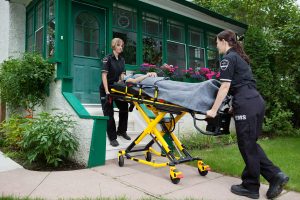
Project FREEDOM will better equip emergency medical service workers and fire personnel to respond cases of opioid overdoses in rural Alabama.
TUSCALOOSA, Ala. – The University of Alabama School of Social Work and the Alabama Department of Mental Health’s efforts to stem opioid use and rates of overdose deaths in Alabama have a new focus: first responders.
The School’s Vital Team, which oversees a trio of state-focused behavioral health projects, will soon begin work on “Project FREEDOM: First Responder Expansion of Education and Distribution of Overdose Medication,” which aims to reduce opioid overdose deaths in rural Alabama through training first responders at varying local levels on how to respond to opioid overdoses, particularly the administration of Narcan, an emergency drug used to treat opioid overdoses.
The four-year, $3.2 million project will focus on 14 rural counties – Blount, Cullman, Etowah, Fayette, Franklin, Jackson, Lawrence, Marion, Marshall, Morgan, St. Clair, Shelby, Walker, and Winston – and two urban counties – Jefferson and Tuscaloosa – all of which have a combination of high opioid overdose rates and low resources.
The University of Alabama School of Social Work and the Alabama Department of Mental Health have partnered on Project FREEDOM, which is funded by the Substance Abuse and Mental Health Services Administration.
Alabama’s rate of opioid overdose deaths more than doubled from 2012 to 2017, according to the National Institute on Drug Abuse. In 2017, Alabama recorded 422 opioid overdose deaths.
“Alabama’s first responders have a critical role in the battle against the opioid overdose epidemic,” said Dr. David L. Albright, Hill Crest Foundation Endowed Chair in Mental Health Research and Vital primary investigator. “In this project, we will work to support our first responders by studying burnout, fatigue, and secondary traumatic stress among emergency medical service workers and municipality and volunteer fire personnel, and develop outreach and training related to the experiences of our first responders, including learning communities on opioid overdose within the catchment area.”
Additionally, first responders will receive training and education on opioid overdoses and reversal, opioid safety, and occupational hazards related to opioid exposure. The project will also provide education to the general public about opioid safety and the Good Samaritan Law
“In addition to first responders, the project will have a focus on healthcare provider training related to opioid overdose dangers, overdose surveillance data in their county, and treatment and recovery options for their patient population,” said Shanna McIntosh, Vital project director.
“It is important for Alabamians to understand the dangers of exposure overdose, proper use and disposal of prescribed opioids, and the Good Samaritan Law, which is in place to encourage bystanders to take action when someone is in need. A targeted media campaign will run statewide and community education forums will be held in the 16 county catchment area. Community trainings will cover the dangers of high toxicity opioids, opioid prescription safety and Mental Health First Aid.”
To supplement county-level reports, co-investigator and lead evaluator, Dr. Justin McDaniel, an assistant professor of public health at Southern Illinois University, will be creating geographic visualization, or “heat maps,” of opioid overdoses and associated predictive modeling so as to enable targeted efforts at the neighborhood-level.
Project FREEDOM is the third state-focused project the Vital Team is overseeing. The Vital Team recently began work on a state-funded project to reduce infant mortality rates in Alabama. Vital is also in its fourth year of an AL-SBIRT contract to integrate mental health care and alcohol and drug screenings into primary care settings.
“Vital is committed to improving wellness in Alabama through engagement, collaboration, research, and education. We remain thankful for the opportunity to serve Alabama,” Albright said.